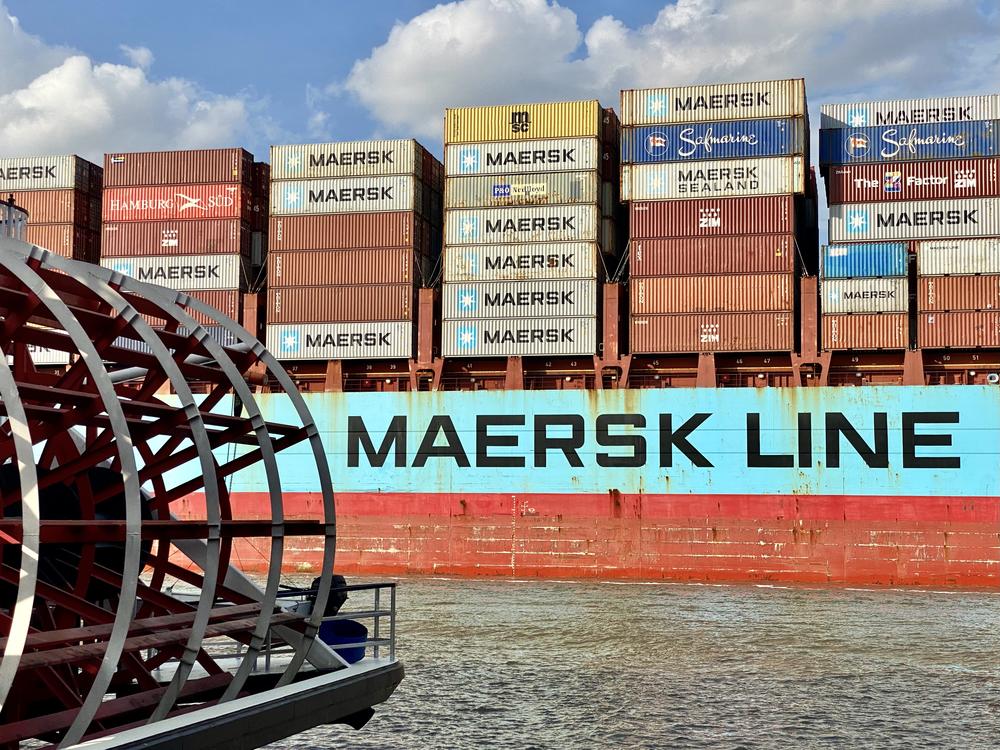
Caption
The container ship Adrian Maersk sails past the riverboat Georgia Queen on the Savannah River.
Credit: Benjamin Payne / GPB News
It's unusual to see a car in the U.S. with its steering wheel on the right-hand side. But rows and rows of them parked together?
It's a common sight at the Port of Savannah.
“It's export cargo that has to go to Australia and New Zealand,” said Susan Gardner as she drove through a warehouse at the port's Ocean Terminal, where she works as the administrator.
These cars — which await fumigation to kill any stink bugs inside or hitching along before getting shipped thousands of miles away — will make the long trip in a cargo ship akin to an ocean-going parking garage.
But at Ocean Terminal, the days are numbered for bulk carriers like this, as the terminal is undergoing a major expansion and overhaul that will see it deal entirely in containerized cargo.
That's pretty much anything you see on a store shelf: toothbrushes, two-by-fours, frozen foods, you name it. They make the trip in corrugated steel boxes stacked by the thousands on container ships.
Container shipping saw record-high traffic at the Port of Savannah during the earlier stages of the COVID-19 pandemic. At times, dozens of ships would sit offshore at anchor.
“We've come out of a couple years of craziness,” Gardner said of the port's boom since 2020. “It's hard to meet expectations when you've got 120% of the volume that you can handle.”
Trade has slowed down in recent months. In January, for example, import and export cargo fell by 16% and 11.5%, respectively, compared to the same month last year.
But the drop-off doesn't bother Georgia Ports Authority executive director Griff Lynch.
“The best time to build out facilities in a containerized or terminal operation environment is probably when it is a little bit slower,” Lynch said. “So, for us, we think this is the perfect time to double down, make sure we build out our capacity while it's slow. These projects take time. The lead time is two to three years. So, the hope is that when this project comes online, we'll be ready to go and then absorb any new business that wants to come to Georgia.”
The keyword is business, not just cargo: Lynch expects tens of thousands of new jobs will be created as a result of the increased container capacity — not just at the port itself, but in factories and warehouses in the Savannah area.
To back up that claim, Lynch pointed to a study from the University of Georgia's Terry College of Business, which estimated that the Ports of Savannah and Brunswick account for roughly one out of every nine jobs in the state.
No wonder why, as the Port of Savannah is the fourth-busiest in the country, behind only the ports of Long Beach, Calif.; Los Angeles and New York.

The container ship Adrian Maersk sails past the riverboat Georgia Queen on the Savannah River.
How did Savannah’s port come to punch so far above its weight? Part of the answer lies not in the port itself, but where it is. Once container shipping cargo is offloaded to freight trains, the westward trip from Georgia is often shorter than it would be from other East Coast ports.
In fact, pull up a map and you'll see that Savannah is further west than you might think: roughly between Pittsburgh and Cleveland.
“Even though there's port competition along the Atlantic Coast, a lot of that competition is vying for [markets] further westward in the hinterland: the Ohio Valley, St. Louis, Chicago, Cleveland,” said University of Georgia urban planning professor Stephen Ramos, who studies ports.
In addition to this lucky longitude — as well as its close proximity to Atlanta and other markets in the South — the Port of Savannah is unique in that it stands as the largest U.S. port run by a single operator, which can make it easier to streamline expansion projects.
It remains to be seen whether this project will be finished by its scheduled completion in February 2026, as a possible recession threatens to delay capital improvement at U.S. ports, according to analysts at Fitch Ratings.
The overhaul will involve building two new berths capable of handling some of the world's largest ships. Even without economic headwinds, it would be a formidable project — but it's one that Gardner is keen on seeing through.
“Every person that works at the port is impacting something happening in Georgia and beyond, potentially,” Gardner said. “It shouldn't be treated lightly. A mom-and-pop business lives and dies by that one container that they get in and out of here every two weeks. Taking pride of ownership for something like that is something to be pretty excited about.”